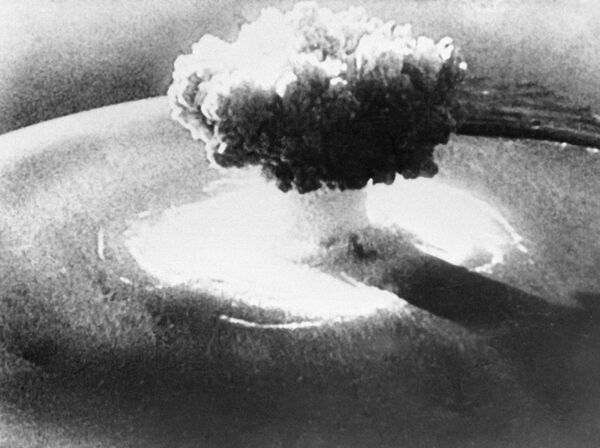MOSCOW, August 29 (RIA Novosti) - The International Day against Nuclear Tests, marked every year on August 29, was established on December 2, 2009 by the UN General Assembly’s Resolution 64/35.
A draft resolution on this issue was proposed by Kazakhstan and co-authored by 26 countries, including Armenia, Belarus, Tajikistan and Turkmenistan.
On August 29, 1991, Kazakh President Nursultan Nazarbayev signed an executive order on shutting down the Semipalatinsk Nuclear Test Site, thus launching the process of eliminating the country’s nuclear arsenal, one of the world’s largest.
The Semipalatinsk Nuclear Test Site was established in 1948 to detonate the first Soviet atomic bomb. It became the second-largest nuclear testing site and held the fourth-largest nuclear arsenal in the world.
From 1949 to 1989, at least 468 nuclear tests were conducted at Semipalatinsk. The total yield of nuclear warheads detonated there between 1949 and 1963 exceeded the yield of the US atomic bomb dropped on Hiroshima by 2,500. Radioactive clouds from 55 air and ground explosions, as well as gas particles from 169 underground tests, drifted beyond the testing site and contaminated the whole of eastern Kazakhstan.
Nazarbayev signed an executive order on shutting down the testing site soon after Kazakhstan became independent.
About 1.3 million people have the official status of Semipalatinsk nuclear test victims. High mortality rates continue to be posted near Semipalatinsk, and the incidences of malignant tumors remain critical. Many children have birth defects and the average local life expectancy does not exceed 40 to 50 years.
The International Day against Nuclear Tests aims to raise public awareness of the consequences of nuclear tests, as well as any other nuclear explosions, and the need to stop them.
The preamble of Resolution 64/35 emphasizes that "every effort should be made to end nuclear tests in order to avert devastating and harmful effects on the lives and health of people" and that "the end of nuclear tests is one of the key means of achieving the goal of a nuclear-weapon-free world.”
The International Day against Nuclear Tests was first observed in 2010. Since then, various coordinated events take place on August 29, including symposiums, conferences, exhibitions, competitions, publications, lectures at universities and media broadcasts.
On August 29, 2012, the Kazakh president addressed an international parliamentary conference in Astana and launched the ATOM Project as a vehicle to generate global popular support for the complete cessation of nuclear weapons testing and, ultimately, the abolition of nuclear weapons.
Currently, almost 94,000 people from more than 100 countries have signed the project’s online petition. Those involved in the project hoped to collect 100,000 signatures by August 29, 2014.


